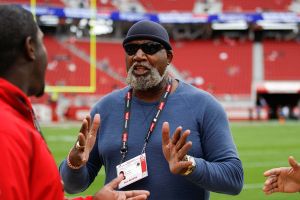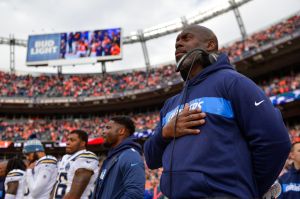Super Bowl LIII: Black NFL Head Coaches And How To Get More Hired
What Will It Take To Get More Black Coaches In The NFL?

Source: Michael Zagaris / Getty
Like corporate America, National Football League teams have just a handful of African-Americans in top leadership positions such as general manager and head coach. Indeed, the ranks became thinner recently when owners purged the league of more than 70 percent of its Black head coaches at the end of this regular season.
SEE ALSO: Will New Professional Football League Allow Players To Kneel In Protest Of Racism?
The reality is that team owners have little incentive to fill head coaching vacancies with African-Americans. Since 2003, the NFL adopted the so-called Rooney Rule that requires teams to interview minority candidates for head coaching positions, but there is no attached mandate for teams to hire them. That caveat rendered the rule all but ineffective, according to Harry Edwards, professor emeritus in the sociology of sports at the University of California at Berkeley.
“The Rooney Rule was stillborn because it was toothless,” Edwards, a former staff consultant with the NFL’s San Francisco 49ers, told NewsOne recently. “The Rooney Rule said this will give us (owners) cover in case we don’t have a representative number of Black head coaches in a league that’s overwhelmingly Black.”
With Super Bowl Sunday upon us and given the apparent failure of the Rooney Rule, diversity advocates have been scrambling to find solutions after the massive purge. The Fritz Pollard Alliance, which promotes equality of job opportunity in the NFL, was pushing league officials to commit each team to hire two minority coaches in low-level positions. The hope is that the new hires will eventually climb the coaching ladder to land top jobs, including head coach.
But Edwards, a longtime civil rights activist explained that owners and general managers will only hire more Black head coaches in higher numbers when they realize that it makes business sense, Edwards said. The NFL was headed in that direction, but not anytime soon, he said.
Already, African-American athletes represent a high percentage of the players in NFL locker rooms, and Edwards predicted that figure would increase sharply in years to come.
Based on his insider’s knowledge and observations of the game, Edwards said teams currently use Black assistant coaches to manage and motivate young Black football players. That’s because the Black coaches tend to connect and relate better to Black players than their white coaching counterparts do.
In time — when locker rooms have even more Black players — more team owners and general managers will recognize the need to hire Black head coaches to manage those players so that they could compete for championships and thus increase their profits, Edwards said.
By the time the NFL regular season ended, five of the league’s seven Black head coaches had been fired. Four of them lost their jobs on New Year’s Eve, which was ominously dubbed Black Friday.
The Cincinnati Bengals’ Marvin Lewis had survived for 16 seasons as head coach of the team. But having the most wins in franchise history didn’t save Lewis from getting a pink slip on Black Monday. Also fired were the Cleveland Browns’ Hue Jackson who lost his job in October, New York Jets’ Todd Bowles, Denver Broncos’ Vance Joseph and Arizona Cardinals’ Steve Wilks.
Out of 32 teams, nly two Black head coaches remained—Mike Tomlin in Pittsburgh and Anthony Lynn with the L.A. Chargers.

Source: Dustin Bradford / Getty
In 1989, Art Shell, a Hall of Fame offensive tackle, became the first Black NFL head coach. Back in the 1920s, a Black running back named Fritz Pollard was a player-coach for the Hammond Pros from 1923 – 1925 when the league consisted of a patchwork of franchises. But in the modern era, the NFL was the last major professional sports league to hire a Black head coach.
Nowadays, none of the 32 teams have a single Black person with a majority ownership stake, according to data analyzed by the Institute for Diversity and Ethics in Sport. Approximately 70 percent of the NFL’s players are Black, but at least 75 percent of the head coaches were white in 2017.
The racial composition of NFL locker rooms is reason enough why it would make good business sense for owners to hire more Black head coaches, Edwards said. He said the population of Black NFL players will balloon to at least 80 percent with the next generations of college athletes who make it to the league.
“At the same time, you have increasingly white front offices and head coaches who can’t relate, empathize or motivate these Black players the same way that a Black head coach can” Edwards added.
The way things stand today, general managers readily hire African-Americans for assistant coaching positions to have them manage situations with Black athletes in the locker rooms, according to Edwards. That’s where some fired Black head coaches wind up, he said.
“It will be what always happens when a Black head coach gets fired. If they’re lucky, they’ll get on as an assistant coach somewhere else,” he said. “Most of them have relationships with head coaches who will need somebody Black in the locker room to manage and communicate with the overwhelming number of Black players.”
SEE ALSO:
















